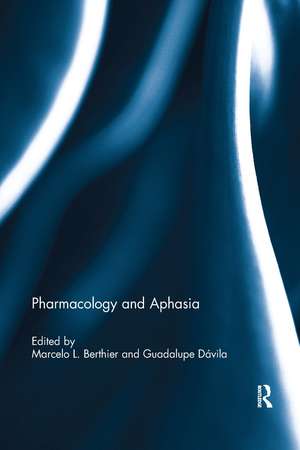Pharmacology and Aphasia
Editat de Marcelo Berthier, Guadalupe Davilaen Limba Engleză Paperback – 18 dec 2020
This book was originally published as a special issue of Aphasiology.
Preț: 243.50 lei
Preț vechi: 309.50 lei
-21% Nou
Puncte Express: 365
Preț estimativ în valută:
46.59€ • 48.78$ • 38.55£
46.59€ • 48.78$ • 38.55£
Carte tipărită la comandă
Livrare economică 07-21 aprilie
Preluare comenzi: 021 569.72.76
Specificații
ISBN-13: 9780367738921
ISBN-10: 0367738929
Pagini: 146
Dimensiuni: 174 x 246 mm
Greutate: 0.27 kg
Ediția:1
Editura: Taylor & Francis
Colecția Routledge
Locul publicării:Oxford, United Kingdom
ISBN-10: 0367738929
Pagini: 146
Dimensiuni: 174 x 246 mm
Greutate: 0.27 kg
Ediția:1
Editura: Taylor & Francis
Colecția Routledge
Locul publicării:Oxford, United Kingdom
Public țintă
Postgraduate, Professional, and UndergraduateCuprins
1. Cognitive enhancing drugs in aphasia: A vote for hope Marcelo L. Berthier 2. Psycholinguistics of aphasia pharmacotherapy: Asking the right questions Dalia Cahana-Amitay, Martin L. Albert, and Abigail Oveis 3. Dopaminergic therapy in aphasia Sumanjit K. Gill and Alexander P. Leff 4. A clinical study of the combined use of bromocriptine and speech and language therapy in the treatment of a person with aphasia Mandy A. Galling, Neetish Goorah, Marcelo L. Berthier, and Karen Sage 5. Massed sentence repetition training can augment and speed up recovery of speech production deficits in patients with chronic conduction aphasia receiving donepezil treatment Marcelo L. Berthier, Guadalupe Dávila, Cristina Green-Heredia, Ignacio Moreno Torres, Rocío Juárez y Ruiz de Mier, Irene De-Torres, and Rafael Ruiz-Cruces 6. Neuroplasticity, neurotransmitters and new directions for treatment of anomia in Alzheimer disease Adam D. Falchook, Kenneth M. Heilman, Glen R. Finney, Leslie J. Gonzalez-Rothi, and Stephen E. Nadeau 7. Effects of memantine treatment on language abilities and functional communication: A review of data Michael Tocco, Kathryn Bayles, Oscar L. Lopez, Robert K. Hofbauer, Vojislav Pejović, Michael L. Miller, and Judith Saxton
Notă biografică
Marcelo L. Berthier is a member of the Unidad de Neurología Cognitiva y Afasia of the Centro de Investigaciones Médico-Sanitarias at the University of Malaga, Spain, and is interested in using different strategies to treat aphasia. Most of his current work concerns the treatment of post-stroke aphasia combining intensive rehabilitation with drugs.
Guadalupe Dávila is a member of the Unidad de Neurología Cognitiva y Afasia of the Centro de Investigaciones Médico-Sanitarias at the University of Malaga, Spain and is interested in using different strategies to treat aphasia. Most of his current work concerns the treatment of post-stroke aphasia combining intensive rehabilitation with drugs.
Guadalupe Dávila is a member of the Unidad de Neurología Cognitiva y Afasia of the Centro de Investigaciones Médico-Sanitarias at the University of Malaga, Spain and is interested in using different strategies to treat aphasia. Most of his current work concerns the treatment of post-stroke aphasia combining intensive rehabilitation with drugs.
Descriere
This book provides an up-to-date of the research on pharmacotherapy of aphasia. Leaders in the field review the literature and provide new data on treatment. Clinicians and researchers will find this book an essential source of information on pharmacological approaches to aphasia.
This book was originally published as a special i
This book was originally published as a special i
